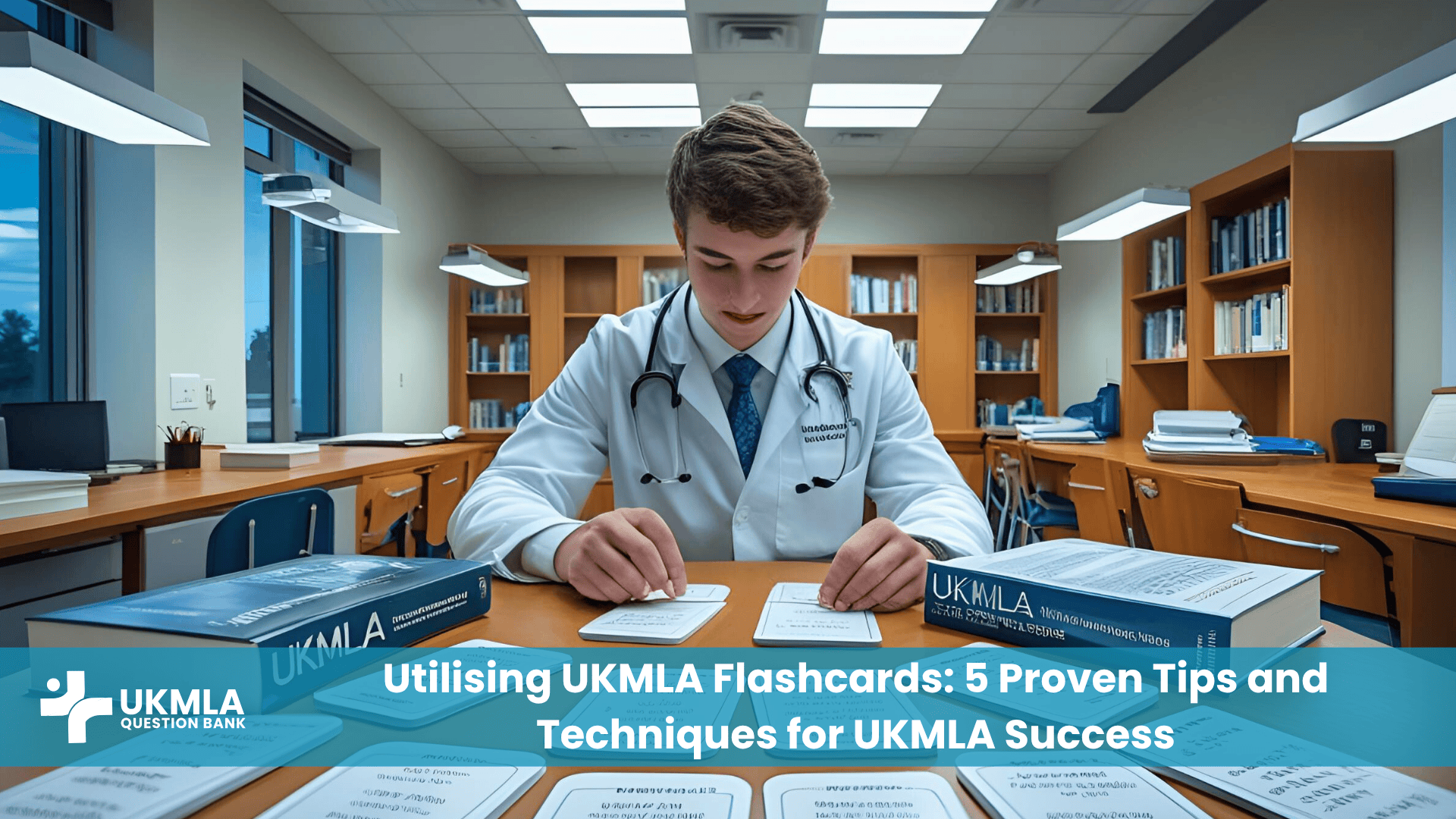Introduction
For students preparing for the UK Medical Licensing Assessment (UKMLA), efficient study techniques are essential to maximise exam performance. Among the most effective tools for this purpose are flashcards, which facilitate active recall and long-term retention. By utilising UKMLA flashcards, you can engage in a highly effective learning process that reinforces key concepts, helping you succeed in both the Applied Knowledge Test (AKT) and Clinical Practice Situational Assessment (CPSA).
In this post, we will explore 5 proven tips and techniques for using UKMLA flashcards effectively, from active recall and spaced repetition to incorporating practice questions. By following these strategies, you’ll optimise your study routine and improve your chances of UKMLA success.
Why UKMLA Flashcards Are Essential for Your Exam Preparation
The Power of Active Recall
Active recall is one of the most efficient memory techniques, and flashcards are perfectly suited for this strategy. Unlike passive review methods, where you simply read over material, active recall forces your brain to retrieve information from memory. This process strengthens neural connections and solidifies your understanding of key medical concepts.
Flashcards help reinforce this by providing a quick, engaging way to repeatedly test your knowledge. As you quiz yourself, your brain actively recalls the information, improving memory retention and making it easier to recall during the UKMLA AKT.
Spaced Repetition and Long-Term Retention
Spaced repetition is another key factor in successfully using flashcards. This technique involves reviewing flashcards at increasing intervals, which has been shown to improve long-term retention. Initially, flashcards are reviewed frequently, and as you master the content, the time between reviews increases. This approach helps move information from short-term to long-term memory.
Key Point: Spaced repetition maximises your study time, focusing on the content that you struggle with most, while gradually increasing intervals for easier content.
5 Proven Tips for Using UKMLA Flashcards Effectively
1. Focus on High-Yield Topics
One of the most important strategies for using UKMLA flashcards effectively is to focus on high-yield topics. These are the subjects and conditions that are most likely to appear in the exam. The UKMLA Content Map and question banks are invaluable tools for identifying these topics.
When creating your flashcards, prioritise conditions that are tested frequently, such as cardiology, neurology, infectious diseases, and general practice. By concentrating on these areas, you ensure that your flashcard study is aligned with what’s most relevant for the UKMLA.
Internal Link: UKMLA Question Bank: An Essential Resource for Medical Aspirants
2. Create Concise, Fact-Based Flashcards
Flashcards should be simple, focused on key facts. For example, instead of writing long paragraphs, create flashcards with concise questions and answers that cover a single concept, disease, or clinical guideline.
For example
| Front of Card | Back of Card |
|---|---|
| What is the first-line treatment for acute ischemic stroke? | Thrombolysis within 4.5 hours if no contraindications exist. |
Conclusion: Forging a Stronger Path to UKMLA Success
Integrating your clinical experience with dedicated UKMLA book study is not just an exam tactic; it’s a fundamental approach to becoming a more insightful and effective physician. This synergy allows you to transform abstract knowledge into applicable skills, fostering the deep understanding and clinical reasoning that the UKMLA aims to assess. By actively reflecting on patient encounters, using clinical questions to drive your learning, and leveraging resources that mirror real-world medicine, you build a robust foundation for both exam success and your future practice. The journey requires discipline, effective time management, and a commitment to continuous learning from every available source. Embrace the dynamic interplay between theory and practice, and you’ll find your UKMLA preparation becomes more engaging, relevant, and ultimately, more successful. Your future patients will benefit from the well-rounded, clinically astute doctor you are striving to become. Ready to bridge the gap between your clinical experience and UKMLA book study? Explore UKMLAQuestionBank.com for resources designed to enhance your clinical reasoning and exam performance. Start integrating effectively today!This approach ensures that each flashcard tests only one specific piece of information, which can be easily recalled during the exam.
3. Use Visual Cues and Mnemonics
Incorporating visual cues such as diagrams, graphs, and pictures into your flashcards can significantly enhance learning. For example, adding a diagram of the brain’s blood supply alongside stroke management flashcards can help you visualise the location of a stroke and the affected vascular territory.
Additionally, mnemonics can be a great tool for memorising complex concepts. For instance, to remember the signs of meningitis:
Mnemonic: “Fever, Neck stiffness, Altered mental status” = “FNA” for Fever, Neck stiffness, and Altered mental status.
Blockquote: Integrating visual cues like diagrams and mnemonics into your flashcards can boost your ability to recall complex concepts under exam conditions.
4. Review Flashcards Regularly with a Set Schedule
Flashcards are only effective if you review them consistently. Set aside dedicated time each day to go through your flashcards, and follow a spaced repetition schedule to maximise your retention.
Here’s an example of a spaced repetition schedule:
| Day | Action | Review Interval |
|---|---|---|
| Day 1 | New flashcards introduced | First review after 1 day |
| Day 3 | First review | Second review after 3 days |
| Day 7 | Second review | Third review after 1 week |
| Day 14 | Third review | Fourth review after 2 weeks |
Key Point: Creating a review schedule ensures you don’t miss important concepts, and the spaced repetition method will strengthen your long-term retention.
5. Incorporate Practice Questions for Active Engagement
To get the most out of your UKMLA flashcards, combine them with practice questions that mimic the UKMLA exam format. While flashcards provide the theoretical foundation, practice questions help you apply that knowledge in a clinical context, which is crucial for both the AKT and CPSA components of the exam.
By solving UKMLA-style questions alongside your flashcards, you actively engage with the material, reinforcing your ability to think critically and make clinical decisions—skills that are essential for both parts of the exam. For a more comprehensive guide on mastering this approach, refer to Mastering the UKMLA 2025: Your Comprehensive Guide to Success.
The Role of Flashcards in A#ctive Learning for the UKMLA AKT
Flashcards are not just for memorisation; they are central to active learning. Active learning encourages you to interact with the material directly, rather than simply reading or memorising. Using flashcards with active recall ensures that you constantly test your understanding, which strengthens both memory retention and problem-solving skills, crucial for the UKMLA AKT.
Combining flashcards with UKMLA Question Banks and mock exams provides a comprehensive approach to your revision, making sure you’re well-prepared for every aspect of the exam. For more tips on effective preparation, see How to Pass the UKMLA: Essential Tips for Success.
Common Pitfalls and How to Avoid Them When Using UKMLA Flashcards
Overloading Flashcards with Too Much Information
While it’s tempting to create comprehensive flashcards, too much information can overwhelm you. Stick to key concepts and simple, direct concepts. Flashcards should focus on facts, diagnoses, and management plans rather than entire chapters or lengthy descriptions.
Forgetting to Follow the Spaced Repetition System
The spaced repetition system is the cornerstone of flashcard effectiveness. If you skip reviews or cram all the information in one sitting, it can diminish the power of the technique. Be consistent with your review schedule and stick to the intervals.
Frequently Asked Questions (FAQ) About Using Flashcards for UKMLA
Flashcards are ideal for reinforcing key concepts through active recall. They allow you to test your knowledge regularly and remember clinical guidelines, drug treatments, and high-yield topics relevant to the UKMLA.
While pre-made flashcards are convenient, creating your own allows for more personalisation. Custom flashcards enable you to focus on areas where you need the most improvement, ensuring effective learning.
Review your flashcards daily, using a spaced repetition technique to optimise retention. As you get more familiar with the material, you can space out your review sessions further, typically reviewing them every few days to solidify your knowledge.
Make flashcards for high-yield topics, focusing on the most challenging material. Aim for a manageable number, and be sure to review them regularly.
Yes, digital flashcards (e.g., Anki, Quizlet) are a great option, as they often incorporate spaced repetition algorithms that automatically adjust review intervals based on your progress.
Yes! Flashcards are beneficial for both the AKT and CPSA. They help with memorising clinical facts, guidelines, and disease management. For the CPSA, use flashcards to memorise clinical skills, patient safety protocols, and professional standards.
Refer to the UKMLA content map and question banks to ensure you’re focusing on the right topics. Prioritise high-yield topics and areas where you feel less confident.
Yes, flashcards help reduce anxiety by building confidence in your knowledge. Regular review of flashcards ensures that you’re well-prepared, leading to a more confident exam day.
Absolutely. Flashcards are excellent for theory-based subjects like pharmacology, clinical guidelines, and anatomy. They help simplify complex concepts for easier memorisation.
Integrate flashcards into your daily study sessions, alongside other methods like mock exams and practice questions. Focus on active recall and spaced repetition to improve retention.
Conclusion
Flashcards are a powerful tool in your UKMLA preparation. By using active recall and spaced repetition, you can effectively reinforce key concepts and improve your retention. Incorporating these strategies, alongside practice questions and regular review schedules, will help you maximise your chances of UKMLA success.




